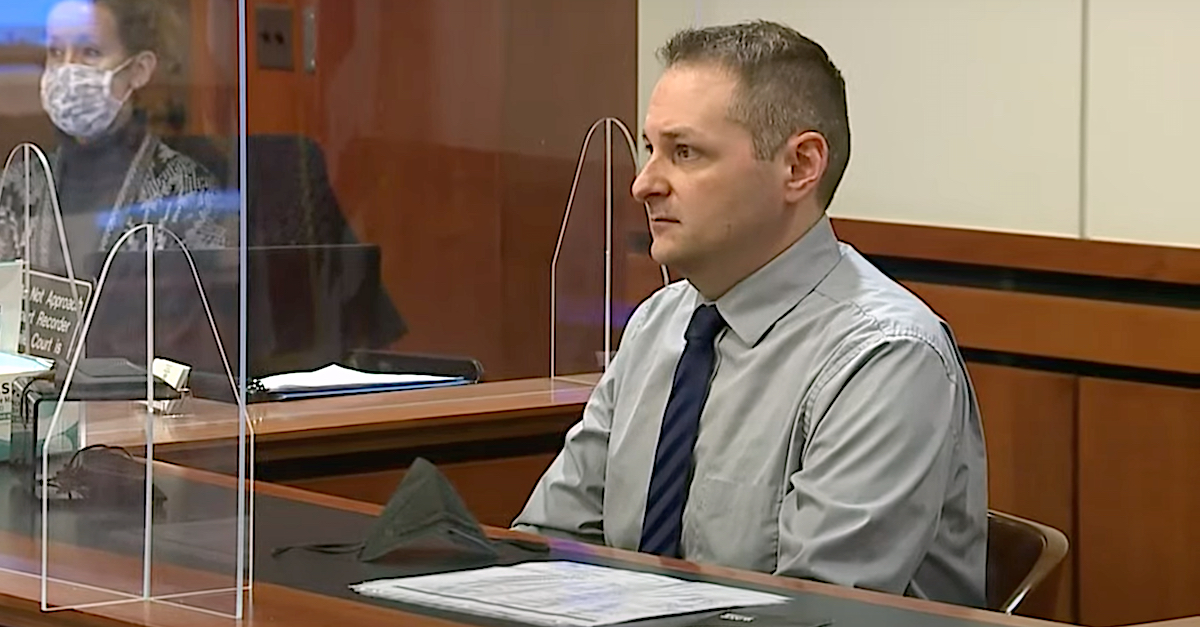
Shawn Hopkins.
A school counselor who interacted with alleged murderer Ethan Crumbley testified Thursday that he spotted warning signs preceding a deadly school shooting in Michigan on Nov. 30, 2021.
The counselor, Shawn Hopkins, faced lengthy questions from a prosecutor and from defense attorneys for the teen’s parents, James Crumbley and Jennifer Crumbley, surrounding the events of November 2021. Questions especially focused on the counselor’s interactions with the two parents — who are now charged in connection with their son’s alleged murderous rampage at Oxford High School — and about whether school officials searched Ethan Crumbley’s backpack.
Hopkins said he only recalled meeting Crumbley once prior to that month.
In early November 2021, Hopkins said a Spanish teacher told him that Crumbley appeared “sad.” Hopkins said he approached Crumbley and said that he heard the student might be having a rough time. Hopkins said Crumbley declined an invitation to talk to Hopkins.
On Nov. 29, Hopkins said a dean of students forwarded him an email from an English teacher. The English teacher said Crumbley had been “looking at bullets” while in class. At 9:00 a.m., Hopkins said he met “for about five minutes” with Crumbley. He said the teen was “compliant, calm, and understanding.” Hopkins said Crumbley “understood” that it was not “school-appropriate behavior” to look at bullets in class.
“He stated that the previous weekend mom and him went to a gun range and went shooting, but it was a hobby that they participated in and he was researching regarding that hobby,” Hopkins recalled of that conversation.
Another school staffer left a voicemail for Crumbley’s parents, Hopkins said. Hopkins said he was present when the message was left.
Hopkins said there were no reports that Crumbley had been bullied.
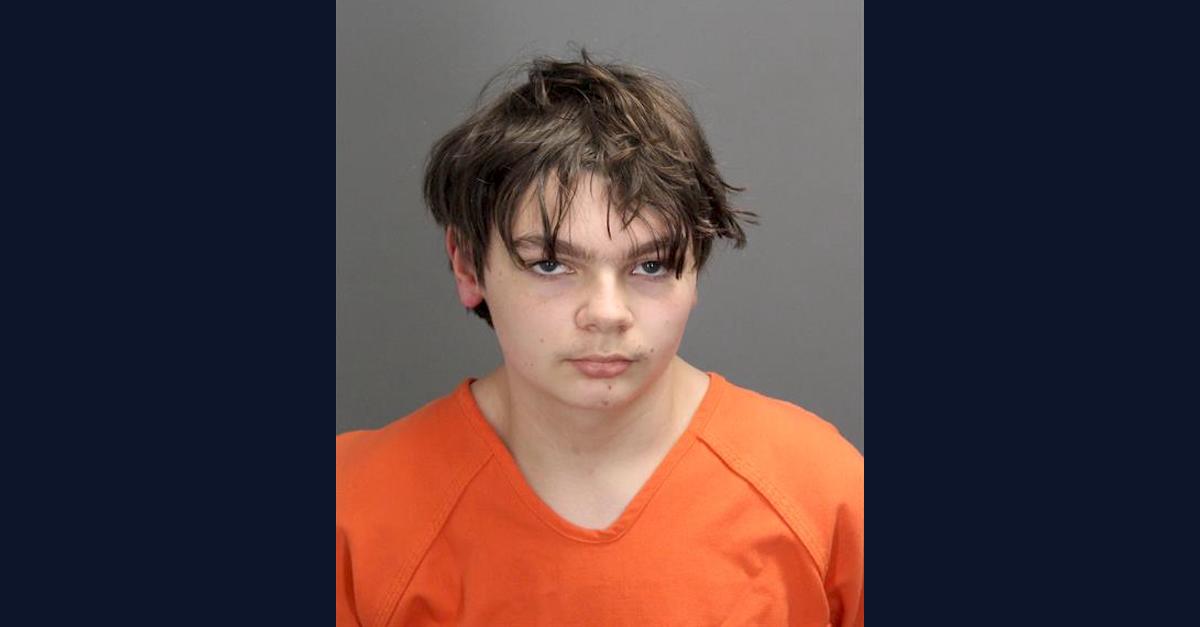
Ethan Robert Crumbley, 15, appears in a mugshot released by the Oakland County Jail in Michigan.
The next morning, Nov. 30, Hopkins said he received an email from a “co-teacher” who caught Crumbley looking at a video of a “shooting” during class. That email was sent at 8:30 a.m.; Hopkins said he saw it at 8:50 a.m.
By then, Crumbley had transitioned to a mathematics class. It was there that Crumbley allegedly drew violent pictures on a math assignment.
“I went to the classroom to get him out of the classroom to have a meeting with him,” Hopkins testified. “I didn’t see much of a demeanor at the time. He was sitting in the front row of the classroom.”
Hopkins said he told Crumbley that he “needed to talk” with him. Hopkins said he grabbed the assignment off Crumbley’s desk.
Hopkins testified that Crumbley claimed the video was a “video game,” not an actual event. Crumbley said he was watching the video game because he wanted to pursue video game design after high school.
“I did have concern about the student, because it was a couple of messages in a couple of days, and the purpose of the meeting was to find out what our next steps would be,” Hopkins testified. “I wanted to make sure he was okay.”
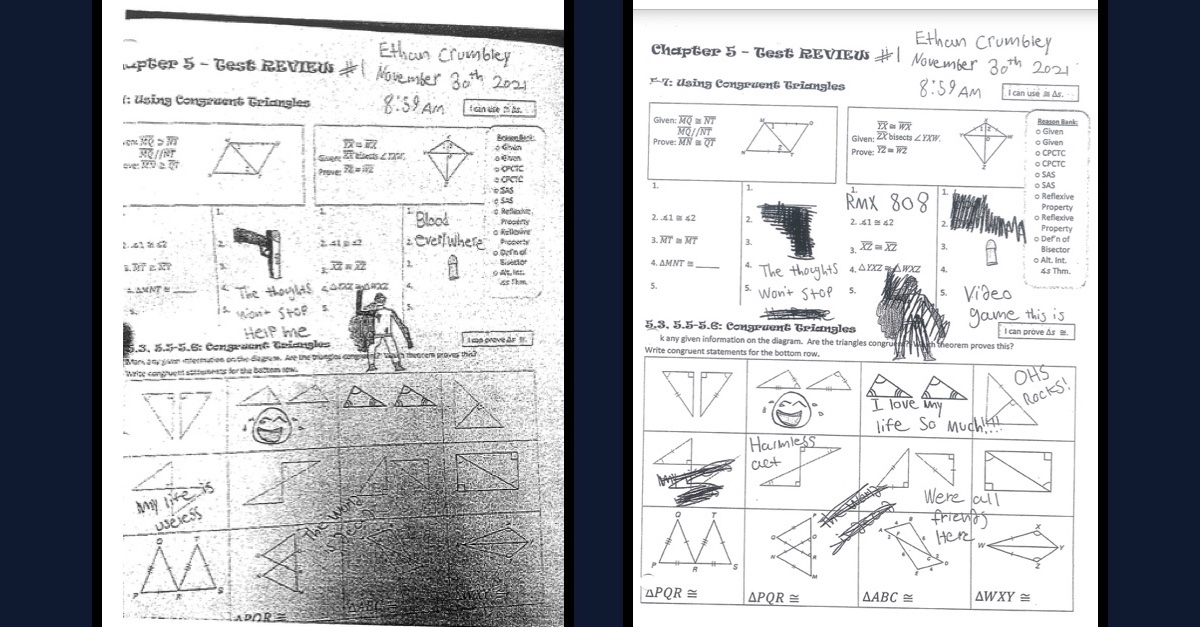
Court records contain copies of images allegedly drawn by Ethan Crumbley before he allegedly shot and killed four people at Oxford High School. The image on the left is said by prosecutors to portray a photo of the original drawings; the image on the right depicts how the drawings were allegedly scratched out and modified by Crumbley after a teacher caught him.
When confronted about the worksheet which said said by the authorities to contain crossed-out images and statements of violence, mayhem, and despair, Crumbley changed his demeanor and became “sad,” Hopkins testified. But Crumbley maintained that the images were part of a video game he wanted to design, Hopkins also testified.
The counselor noted that some of the statements appeared to have nothing to do with a video game.
“He started pausing more in his speech,” Hopkins said. “He then described some things that had happened recently in his life . . . he talked about how a family dog had died; he talked about — he had lost a grandparent; that COVID had been incredibly difficult for him — being out of school — the previous year had been difficult for those virtual days. He talked about a friend who had left . . . had moved. And he talked about an argument about grades the previous night with his parents.”
Hopkins said there was “enough suicidal ideation” to call Crumbley’s mother.
Those were “thoughts, patterns, behaviors, feelings associated with suicide . . . sadness, depression, negative self talk; all of those themes we see associated with suicide,” the counselor then testified. But he distinguished those “ideations” from someone who is “actively suicidal.” The latter would “contain a plan, a method, a date, actions, statements — something he could take action on,” Hopkins said.
The counselor said Oxford High School three students have attempted suicide over the last year and that such occurrences are increasingly common.
Crumbley was “muted” and “resigned” over Hopkins’ attempt to call his mother, the counselor then testified. The counselor left the mother a message, then tried to call the father; he eventually connected with the mother and put her on a speakerphone.
Jennifer Crumbley asked Ethan what was going on. He responded that he didn’t know, Hopkins said. Hopkins said he sent a photo of Crumbley’s worksheet to his mother.
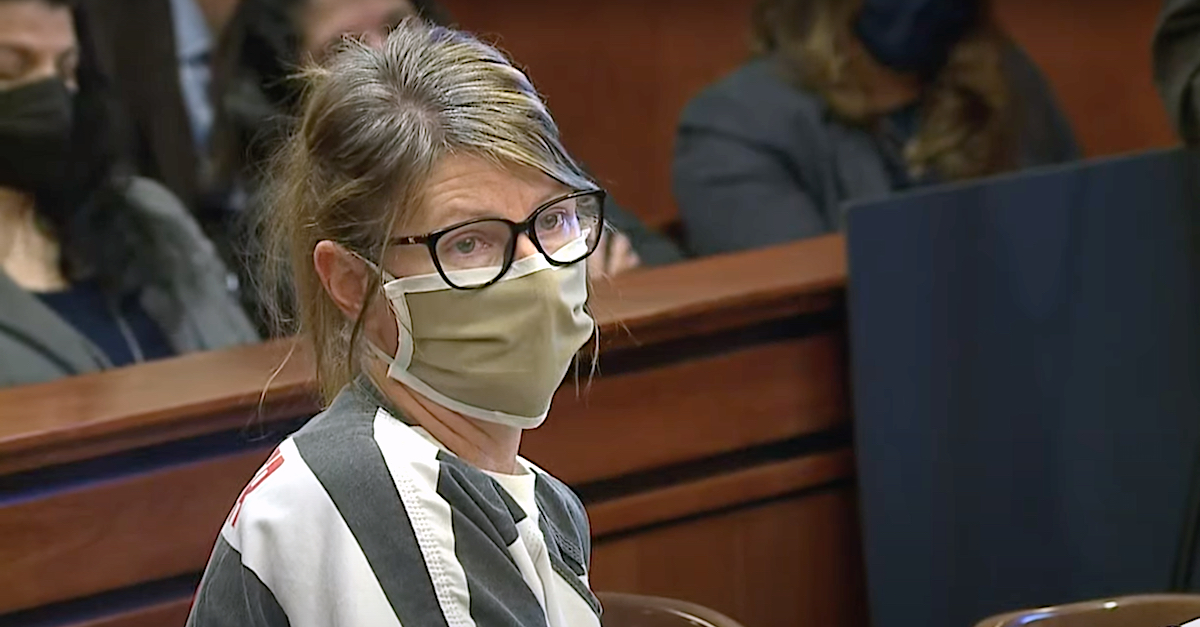
Jennifer Crumbley.
“I asked her to please come to the school,” Hopkins said. Jennifer Crumbley responded that she was at work and would try to get a hold of James Crumbley, Ethan’s father. After unsuccessfully attempting to reach James Crumbley, Jennifer responded by saying it would take her about half an hour to arrive at the school, the counselor testified.
Both James and Jennifer eventually arrived at the school, Hopkins said; the pair arrived somewhere around 10:30 a.m.
Hopkins said he did not leave Ethan Crumbley alone. Ethan talked about his plans after high school, Hopkins testified.
“I asked him if he was a threat to himself or to others,” Hopkins said.
“His statement back to me was, ‘I can see why this looks bad; I’m not going to do anything,'” Hopkins testified.
Hopkins said he asked Crumbley about what he had written but did not ask questions about any possible “plan” to commit violence.
“He stated that he was not a threat to himself or others,” Hopkins repeated.
When Crumbley’s parents arrived, Hopkins said he greeted them in a lobby. Hopkins asked a dean to join the parents, Ethan Crumbley, and himself.
“It was different than other meetings I have seen,” Hopkins said. “They weren’t friendly or showing care to their student.”
The parents didn’t greet, touch, or hug Ethan Crumbley, Hopkins said.
Hopkins said the Crumbley parents didn’t ask questions about what suicidal ideation was. He testified that he told the parents that Ethan needed mental health help “as soon as possible — today, if possible.” Jennifer Crumbley responded that “today was not possible” because she had to return to work. He said he could not recall how James Crumbley responded.
However, “he did not object to anything” that Jennifer Crumbley said, Hopkins testified as to James Crumbley.
“I have never had parents arrive to the school and not take their student home” when requested to do so by school staff, Hopkins said in response to a question by prosecutors about whether the parents’ conduct was out of the ordinary.
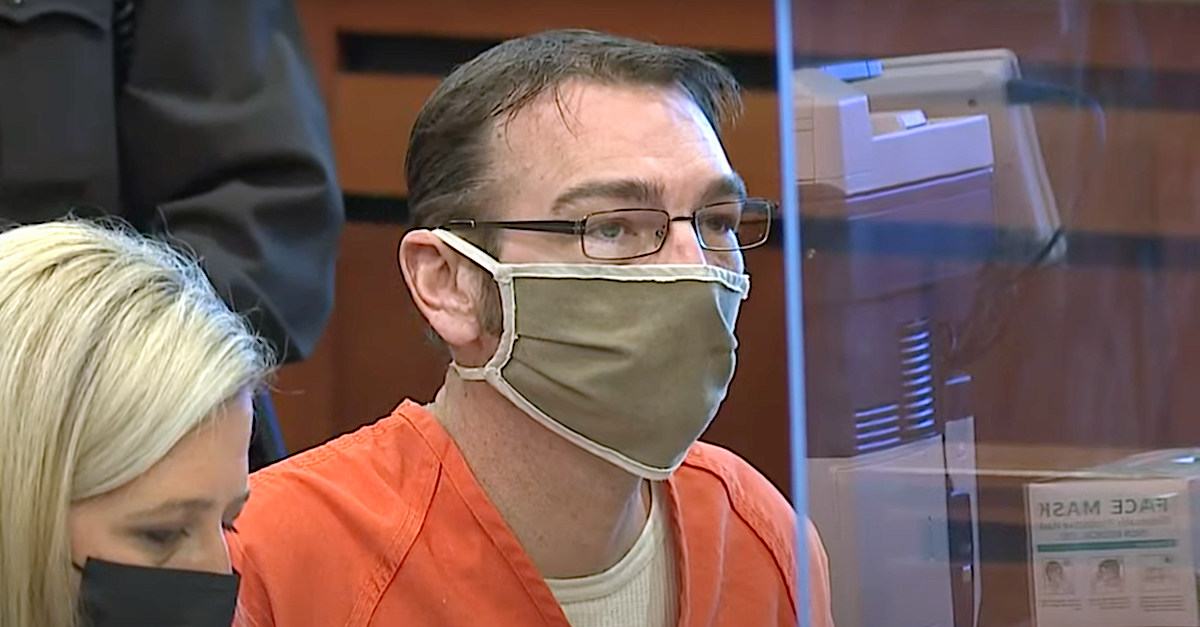
James Crumbley.
Oakland County Prosecutor Karen D. McDonald said she needed to ask that question to prove the parents were grossly negligent in their handling of their son. McDonald’s office has charged both of the parents with four counts of involuntary manslaughter.
“I want him seen within 48 hours,” Hopkins testified that he replied to the Crumbleys. “I will be following up.”
Hopkins said the parents seemed to comply. He said he wasn’t “confidant” that the parents would, indeed, follow through based on their language and demeanor.
The counselor then said his primary concern turned toward ensuring Ethan Crumbley was not left alone.
Hopkins said Jennifer Crumbley never spoke to her son during the fifteen-minute meeting. He said James Crumbley told Ethan that he had “people” he could “talk to,” such as himself (the counselor), the father (James), and a “journal.”
The meeting ended “abruptly,” Hopkins said.
“Are we done?” Jennifer Crumbley allegedly asked him.
He said Ethan Crumbley “wanted to return to class.”
Hopkins said a dean told him that there was “no” disciplinary reason as to why Crumbley could not return to class. Hopkins testified that he wrote a pass for Ethan to return to class and told him that he cared about him.
“I care about my students, and I cared about him in that moment particularly because I thought it was a really rough situation to be showing signs of needing — of needing support,” the counselor said. “And it felt like he got the opposite when I tried to get him that help and support.”
Ethan didn’t cry. His parents didn’t try to hug him or touch him. Ethan didn’t respond to the counselor’s statement of support, Hopkins said.
Hopkins said he checked to make sure he was “being marked present” for his additional courses in an attempt to ensure he wasn’t alone.
Hopkins said he was planning to follow up with Ethan Crumbley the next morning. That plan was cut short when Ethan Crumbley allegedly opened fire and killed four people.
On cross examination, defense attorney Shannon Smith asked Hopkins if he discussed his testimony with prosecutors. He said that he did but said he was not told to avoid any topic or to say certain things.
Smith noted that the first call to Crumbley’s parents didn’t expressly request a callback. She asked the counselor whether looking at bullets in class was a discipline issue; he said he was not a disciplinarian and reiterated that he checked with someone who was.
Smith asked whether Hopkins simply “takes the answer they give as true” when an individual claims to not be a possible threat to others or to themselves.
“I am not a mind reader,” Hopkins said.
Smith reminded him that teenagers “will lie to get out of trouble” and “can lie at any time about anything.”
McDonald objected to the “relevance” of those questions and said they didn’t play into the legal theory of the case.
The judge allowed the questioning to continue.
“I told the parent that I believed he was a threat to himself in spite of his statement,” Hopkins later said.
“Isn’t it true that you gave them the option to take him . . . ” Smith implored. The defense has long claimed that school officials gave Crumbley’s parents the “option” to either leave Ethan in school or take him home on Nov. 30, 2021, the day of the mass shooting.
Hopkins cut her off.
“Absolutely not,” Hopkins said. “I did not provide options. I provided the recommendation that he gets help as soon as possible. Today, if possible.”
“If you thought it was inappropriate for Ethan to stay in school that day, you could have said, ‘he has to leave,’ correct?” Smith asked.
“I could have stated that, correct,” Hopkins said.
What followed was a back-and-forth about disciplinary matters and health concerns that would ordinarily result in a student being sent home. Something as trivial as a student vomiting would result in a student’s dismissal for the day, Smith said.
McDonald again objected to the relevance of the line of questions. Through the back-and-forth, Smith seemed to suggest that the lack of a “firm” decree by school officials that Ethan Crumbley must go home immediately signaled to the parents that school staffers were okay with Ethan remaining in class.
Ergo, Smith seemed to suggest, it was not grossly negligent for the parents to leave Crumbley where he ultimately was alleged to have killed four people.
“You did not go to Mr. [Nicholas] Ejak, the dean,” Smith said, “and say, ‘Ethan needs to go home from school, you make him go home,’ correct?”
“Correct,” Hopkins admitted.
“Ethan was allowed to stay in school?” Smith asked later on.
“Yes,” Hopkins testified.
Smith forced Hopkins to admit that Ejak even retrieved Crumbley’s backpack and brought it to Hopkins’ office.
Law&Crime previously questioned whether a search was done on the backpack and outlined the extremely low legal standard government-employed school officials must meet in order to perform such a search while still complying with the Fourth Amendment. The standard for school searches is much lower than the standard ordinary police officers must meet in order to justify a warrantless search on the streets.
Contrary to Smith’s assertions, Hopkins said Crumbley didn’t request his backpack.
“The backpack was retrieved because classes were changing and we would not leave it in a class for new students,” the counselor testified.
Hopkins agreed with Smith that he “at no time” looked in Ethan Crumbley’s backpack. He also testified that he never observed Ejak search the backpack.
Hopkins said he was “not aware” of where the gun was and that he did not know if he would have seen a gun had he searched the backpack. He agreed that he made “no effort” to search Ethan’s backpack or ascertain what websites he was looking at in class.
Smith also grilled Hopkins over the content of Crumbley’s statements on his math worksheet.
The defense attorney then noted that Jennifer Crumbley worked about an hour away from the school and that James Crumbley was working as a DoorDash driver when school officials asked them to appear.
Hopkins also testified on cross that that as a mandatory reporter of child abuse he did not believe he needed to open a report with regards to Ethan Crumbley.
After a lengthy recess, McDonald, the prosecutor, asked Hopkins if he knew Ethan Crumbley texted a friend that his father had told him to “suck it up” if he was having a “mental breakdown.”
Hopkins said he was not aware of those texts.
Hopkins also said he also was not aware that Jennifer Crumbley allegedly texted her son with the phrases “LOL” followed by “you have to learn not to get caught” after Ethan was caught looking at bullets in class.
Moments later, McDonald asked Hoskins if he knew Ethan “had access to the gun and ammunition.”
Smith and her co-counsel exploded with an objection.
Hopkins previously testified that Ethan Crumbley told him he had “gone to the shooting range with his mother” and was “shooting guns as a hobby,” the defense pointed out.
The judge sustained the defense’s objection.
McDonald asked Hopkins whether the parents ever searched the teen’s backpack. Hopkins said he did not see the parents attempt to search the teen’s backpack.
The authorities have alleged that Ethan Crumbley kept the gun in his backpack, retrieved it, and later opened fire not long after the meeting with Hopkins and his parents.
[images via WJBK-TV/YouTube screengrabs, except as noted]